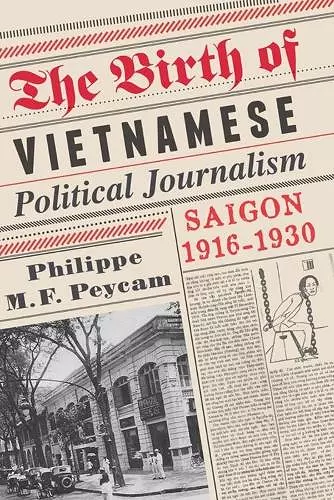The Birth of Vietnamese Political Journalism
Saigon, 1916-1930
Format:Hardback
Publisher:Columbia University Press
Published:11th May '12
Currently unavailable, and unfortunately no date known when it will be back

The Birth of Vietnamese Political Journalism is logically organized, convincingly argued, and well written. There is simply nothing like it in the English, French, or Vietnamese language. -- Hue-Tam Ho Tai, Harvard University, author of Radicalism and the Origins of the Vietnamese Revolution and Passion, Betrayal, and Revolution in Colonial Saigon: The Memoirs of Bao Luong
Philippe M. F. Peycam completes the first ever English-language study of Vietnam's emerging political press and its resistance to colonialism. Published in the decade that preceded the Communist Party's founding, this journalistic phenomenon established a space for public, political contestation that fundamentally changed Vietnamese attitudes and the outlook of Southeast Asia. Peycam directly links Saigon's colonial urbanization to the creation of new modes of individual and collective political agency. To better justify their presence, French colonialists implemented a peculiar brand of republican imperialism to encourage the development of a highly controlled print capitalism. Yet the Vietnamese made clever use of this new form of political expression, subverting colonial discourse and putting French rulers on the defensive, while simultaneously stoking Vietnamese aspirations for autonomy. Peycam specifically considers the work of Western-educated Vietnamese journalists who, in their legal writings, called attention to the politics of French rule. Peycam rejects the notion that Communist and nationalist ideologies changed the minds of "alienated" Vietnamese during this period. Rather, he credits colonial urban modernity with shaping the Vietnamese activist-journalist and the role of the French, even at their most coercive, along with the modern public Vietnamese intellectual and his responsibility toward the group. Countering common research on anticolonial nationalism and its assumptions of ethno-cultural homogeneity, Peycam follows the merging of French republican and anarchist traditions with neo-Confucian Vietnamese behavior, giving rise to modern Vietnamese public activism, its autonomy, and its contradictory aspirations. Interweaving biography with archival newspaper and French police sources, he writes from within these journalists' changing political consciousness and their shifting perception of social roles.
Philippe M. F. Peycam's vivid account makes a unique contribution to contemporary Vietnamese history and colonial studies. Until now, nothing of this scope has been attempted in English. Previous studies of the Vietnamese press have focused on the communist newspaper La Lutte and less systematic samplings of French-sanctioned publications. Peycam instead gives us portraits of writers, publishers, and editors who for months and years put out popular, often financially viable, newspapers to challenge the status quo. He makes judicious use of the reports of the French security police and brings these men and their peculiar mix of French idealism and colonial hypocrisy to life. His portrait of the rapidly changing society of French Indochina's major entrepot emphasizes the hybrid nature of Saigon politics with fascinating detail. -- Sophie Quinn-Judge, Temple University, author of Ho Chi Minh: The Missing Years a welcome addition to the literature on the development of journalism and its role in identity formation and nationalist resistance in Vietnam, Southeast Asia, and the colonized world generally. -- Mark W. McLeod American Historical Review Philippe Peycam brings this story alive for today's readers... -- David G. Marr Southeast Asian Studies Well-researched and fact-filled book -- Dr. Erik Harms Southeast Asia Research Historians of Vietnam will find in the volume abundant theoretical and documentary resources for making sense of the bewildering economic, social, and political changes that swept through French Indochina in the early twentieth century. New Mandala
ISBN: 9780231158503
Dimensions: unknown
Weight: unknown
320 pages